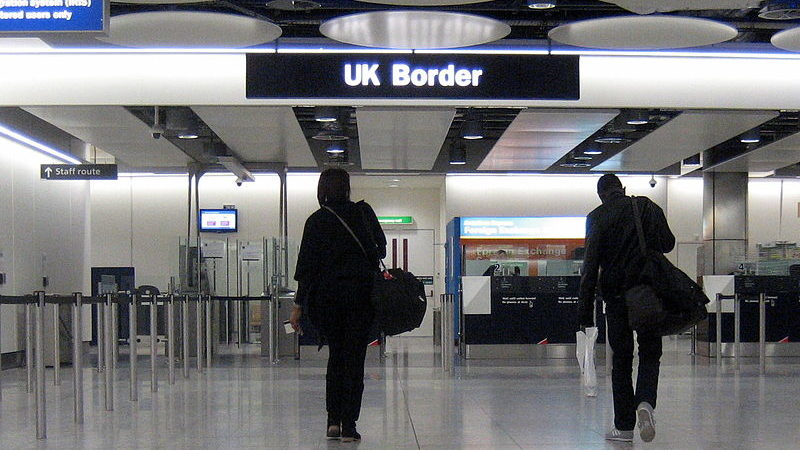
Since 2010, the Conservatives have promised again and again across four general elections that they would slash immigration. A key part of this promise to voters was a “hostile environment” policy, launched by then Home Secretary Theresa May, designed to expose and remove those residing unlawfully while hardening border controls.
Much is written about why this policy is unfair and unjust. It’s easy to see why. Migrants are subject to scapegoating and the painful Windrush scandal continues. Meanwhile, the government presses on seemingly unaware or unconcerned about the injustices adding up. As Kenan Malik remarks: “The ignorance is as shocking as the rules are cruel”.
This is about more than ethics. There will be differences of opinion about whether the means can justify the ends. And this is why it’s important to be clear that not only is the hostile environment the wrong means – it’s not achieving its ends either. Even if someone thought this unjust policy was a price worth paying, it doesn’t do what it says on the tin.
Despite the many efforts of successive Tory government to make the UK a more unwelcome place for immigrant, they have failed. The highest net migration levels ever seen at or above three hundred thousand were all under Tory governments. Their pledge to cut this by over two-thirds is one campaign promise we hear less and less about for good reason.
When we drill further down, we can see why. In 2014, identity checks were introduced for anyone renting private accommodation, opening a bank account or obtaining a driver’s licence to ensure that they had a right to live here. The reason for these checks was to expose people unlawfully resident and create a deterrent.
But these checks have proved a total con. Not a single individual has been newly exposed for living in the UK unlawfully from these checks, though many have encountered discrimination as a result of them. The checks are impotent because they look to confirm whether anyone known residing unlawfully is still around. Nobody unknown is ever discovered.
Deportations aren’t working out either. The latest findings from the Office for National Statistics last week revealed that deportations are actually at the lowest levels “since records began”. It seems many of the individuals singled out for removal – like the Windrush generation – are those with a legal and moral right to stay.
Recently, the government U-turned on an element of the immigration health surcharge policy following significant pressure from Keir Starmer at PMQs. It’s wrong that NHS and care workers who are risking their lives at this time of crisis must pay hundreds of pounds on top of their taxes to access a system that they keep running for our benefit. As a former shadow immigration minister, Starmer understands this principle.
But the surcharge is even worse than that. It was originally promoted as a means to stop so-called ‘health tourism’ and make migrants ‘pay their fair share’. However, two facts about the charge are almost never raised.
The first is that the health surcharge is not determined in light of actual use of the NHS or care services by migrants. It is a guesstimate of any use of public service far beyond health care – despite the fact that most migrants have no recourse to public funds anyway, a point recently lost on the Prime Minister.
The second is that money raised by the health surcharge is neither earmarked for the NHS and care services, nor does it go to the localities where migrants live. If the whole point is to make migrants pay – above and beyond their taxes – for their impact on the health service, it makes no sense that not one penny is earmarked to do any such thing. The migrant health surcharge is an extra tax on migrants but not for any services rendered or received.
Perhaps the most shameful of the policies rarely reported is the Home Office’s form for reporting ex-lovers. This is a printable Word document for telling the government that a relationship is over – presumably with the intention that the former partner might now be deported.
The possibility of this being used by abusers is significant, and yet no risk assessment was conducted before launching it in 2016. At last count, the Home Office has no record of receiving a single form. It’s probably little wonder since the website doesn’t say where they can be sent.
The sheer incompetence is staggering. It is a mistake to see the hostile environment as only morally wrong. On virtually every count, it has made things worse – and often with results that break every promise.
The government now seeks to push through new laws launching a points-based immigration system – forgetting that Labour already did this in 2008. Even the government’s own independent migration advisory committee felt it needed to remind the Home Secretary that the system exists and already does much of what she wants it to achieve.
Instead of announcing more gimmicks, what we need is an evidence-led and spin-free plan. Speaking in jargon where down means up and “fair” creates more inequality will only damage public confidence even further. The Home Secretary needs to start a honest, national conversation to better understand public expectations as a first step towards a system more fit for purpose.




More from LabourList
New intake Labour MPs: ‘Why we set up the Living Standards Coalition’
Andrew Pakes MP: ‘We need blue-collar Labour, not Blue Labour’
LabourList readers reveal their highs and lows of Labour’s first year